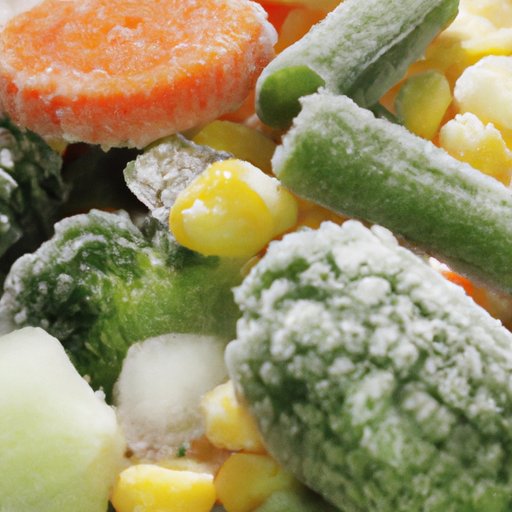Introduction
Frozen vegetables are a convenient and economical way to increase your intake of essential vitamins, minerals, fiber, and other nutrients. They are produced and packaged shortly after harvest, which helps preserve their nutritional content and flavour. This article will explore the nutritional value, health benefits, environmental impact, cost effectiveness, and safety of frozen vegetables.

Comparing the Nutritional Value of Fresh and Frozen Vegetables
Vegetables are an important part of a healthy diet, providing essential vitamins, minerals, fiber, and other nutrients. Fresh vegetables are usually considered to be more nutritious than frozen vegetables, but there is no clear consensus on this. In fact, research shows that frozen vegetables can often contain higher amounts of certain vitamins and minerals than their fresh counterparts.
A study published in the journal Food Chemistry found that frozen vegetables can contain up to twice as much vitamin C as fresh vegetables. The study also found that frozen carrots had higher levels of beta-carotene, a powerful antioxidant, than fresh carrots. Another study, published in the journal Journal of Agricultural and Food Chemistry, found that frozen spinach contained higher levels of iron, calcium, and potassium than fresh spinach.
Exploring the Health Benefits of Eating Frozen Vegetables
Eating frozen vegetables can provide numerous health benefits. Many frozen vegetables are rich in vitamins and minerals, such as vitamin A, vitamin C, folate, iron, and potassium. These nutrients are essential for maintaining good health, and consuming them through frozen vegetables can help ensure that you get enough of these important nutrients in your diet.
Frozen vegetables are also a great source of dietary fiber, which can help promote digestion and reduce the risk of certain diseases, such as diabetes and heart disease. Furthermore, frozen vegetables are low in calories and fat, making them a healthier option than many other processed foods.
Investigating the Environmental Impact of Frozen Vegetables
Frozen vegetables can have a positive environmental impact, as they require less energy to produce than fresh vegetables. They also have a smaller carbon footprint, as they do not need to be transported over long distances. Additionally, frozen vegetables can help reduce food waste, as they last longer than fresh vegetables.
According to a study published in the journal Sustainability, frozen vegetables can help reduce greenhouse gas emissions by up to 40% compared to fresh vegetables. The study also found that frozen vegetables can reduce water consumption by up to 50%, as they require less water for production and transportation.

Analysing the Cost Effectiveness of Buying Frozen Vegetables
Frozen vegetables can be a more cost effective option than fresh vegetables, as they are typically cheaper and last longer. However, there are several factors that can affect the pricing of frozen vegetables, such as seasonality, quality, and packaging. Additionally, some frozen vegetables may contain added ingredients, such as sauces or seasoning, which can increase the cost.
When comparing the price of frozen and fresh vegetables, it is important to consider the cost per serving. For example, a bag of frozen vegetables may cost more than a head of fresh broccoli, but the frozen vegetables will yield more servings overall. Therefore, buying frozen vegetables can be a more economical option in the long run.

Examining the Safety of Frozen Vegetables in the Home Kitchen
Frozen vegetables are generally safe to eat if they are stored and prepared properly. When buying frozen vegetables, it is important to check the label for any signs of spoilage, such as discoloration or off-odours. Additionally, it is important to make sure that the vegetables are cooked thoroughly before consuming, as undercooked vegetables can pose a health risk.
When storing frozen vegetables, it is important to keep them at a temperature of 0°F (-18°C) or below. It is also important to use frozen vegetables within two to three months of purchase, as this will help ensure the freshest taste and highest nutritional value.
Conclusion
Overall, frozen vegetables can be a healthy and economical choice for increasing your intake of essential vitamins, minerals, fiber, and other nutrients. They can also help reduce food waste and have a lower carbon footprint than fresh vegetables. When choosing frozen vegetables, it is important to check the label for signs of spoilage and store them at a temperature of 0°F (-18°C) or below. Additionally, it is important to cook frozen vegetables thoroughly before consuming.
In conclusion, frozen vegetables can be a healthy and cost effective choice for those looking to increase their vegetable intake. They are a convenient and versatile option that can help reduce food waste and have a lower environmental impact than fresh vegetables. By following food safety guidelines when preparing frozen vegetables, you can enjoy their nutritional benefits without compromising your health.
(Note: Is this article not meeting your expectations? Do you have knowledge or insights to share? Unlock new opportunities and expand your reach by joining our authors team. Click Registration to join us and share your expertise with our readers.)
